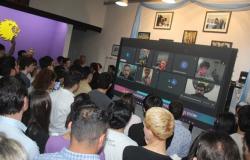Havana-Currently in Cuba 28,643 people live with HIV/AIDS, of which 96.8 percent have treatment, while 89.3 percent of those who receive therapy have a suppressed viral load of the disease.
In 2015, Cuba was certified as the first country in the world to eliminate mother-to-child transmission of HIV/AIDS and congenital syphilis, a condition later revalidated in 2017, 2019 and 2022.
Recently, the Minister of Public Health (Minsap), José Ángel Portal, ratified the Government’s will to protect the nation’s population with HIV/AIDS and, at the same time, cooperate with other countries.
“Cuba ratifies its commitment and firm will to protect and care for the people who live in our country with the virus, as well as to cooperate with other nations to whom the experiences and achievements we have achieved in relation to its prevention may be useful. , diagnosis, treatment and control,” he reported on the Minsap website.
The minister recalled that just over 30 years ago Cuba’s cooperation with the Joint United Nations Program on HIV/AIDS (UNAIDS) began.
There are multiple joint projects and actions launched since then with the aim of protecting and caring for people living with this disease, both in our country and in others around the world, he said.
He reported that with the purpose of evaluating how much has been done along this path and at the same time continuing to look for what more can be done to strengthen it for the benefit of health and life, from May 6 to 9, the executive director of UNAIDS visited Cuba, Winnie Byanyima.
Portal described a working meeting with the expert as fruitful, in which they shared important ideas associated with the development of the National Program for the Prevention and Control of HIV/AIDS, which has been put into practice since 1986 and is based on social prevention, with a community, intersectoral and multisectoral approach.
He highlighted that the results are possible, among other elements, thanks to the State’s political commitment to caring for people living with the virus and the investments it makes to do so.
Likewise, they are due to the characteristics that distinguish the Cuban Health System, based on Primary Care, and a projection towards prevention, an aspect in which the multisectoral approach with which we work is essential, he emphasized.
All of this has broad legal support in various Cuban regulations, such as the Constitution of the Republic, the Family Code and the recently approved Public Health Law.
Together with these elements, it is important to highlight the contributions that the Global Fund, an international organization whose objective is to accelerate the end of epidemics like this one, tuberculosis and malaria, has made in different aspects to Cuba’s fight against HIV/AIDS.
The contribution of UNAIDS is also extremely significant in aspects related to advice, acquisition of medicines and capacity building for the strengthening of the Cuban Program in order to confront the pandemic, stated the head of the Minsap.
SHARE WITH THE WORLD
In the opinion of the executive director of UNAIDS, Winnie Byanyima, Cuba has a lot to share with the world in the fight against HIV, from the importance of having a strong health system to its international solidarity.
Interviewed by Prensa Latina, Byanyima highlighted that Cuba continues to make strong investments in the health and education of its people, as well as in prevention and treatment, and regretted that other countries allocate fewer resources to the health sector.
He noted that it also provides solidarity, by sending its doctors and nurses to fight diseases in more than 50 nations on the planet, a lesson that “can be taught to rich countries, many of which are weakening their aid, and to other income states.” means that can do more to confront HIV/AIDS.”
He argued that this territory can help in the area of human rights, since its Constitution and laws include equality between all and do not discriminate based on sexual orientation or identity, while in dozens of countries this is a great barrier and cannot be achieved. people because there are laws that criminalize.
Byanyima assured that the country can also lead and help in offering technology to the rest of the world, because it has achievements in innovation and research in the different fields of health and in the development of medicines, as evidenced by obtaining its own vaccines against Covid-19. 19.
In this context, he expressed interest in supporting the Antillean territory to disseminate its potential and have more South-South collaboration that brings capital, “because it can gain from the transfer of technology to other developing countries” and “it is in a position to support the development of capabilities in regions such as Africa and Asia.”
On the other hand, the expert considered that Cuba has lessons to learn to advance the goal of ensuring that AIDS stops being a public health threat by 2030. Thus, she mentioned the importance of using communities more and leading the response. about.
We have seen in many countries, he said, that when young people work with people of the same age or LGBTQ people with members of that same group, such a strategy leaves no one behind, so Cuba could do more to reach a greater number of people. through work with these vulnerable groups, he noted.
He also indicated that the island is suffering from economic limitations, which leads to a shortage of resources such as condoms and represents a great challenge that could be solved “if external restrictions were removed.”
Along these lines, he stated that he had appreciated the damage caused to the Cuban response to HIV/AIDS by the economic, commercial and financial blockade imposed by the United States more than 60 years ago, when there is the will to promote the confrontation with the disease and what is missing. It is the necessary money.
The UNAIDS board commented that they traveled to the Caribbean island with the purpose of learning and exploring opportunities for South-South collaboration.
“There are many African countries that are making associations to build their pharmaceutical technology capabilities and I want to investigate how we can support Cuba to be a partner for these territories,” he noted.
Also, he said, he came with the objective of learning how to support the country in ending its fight against HIV, because he knows that it is facing serious economic challenges, and he sees an opportunity for us to advocate on behalf of Cuba in HIV financing circles. in order to purchase some products.






